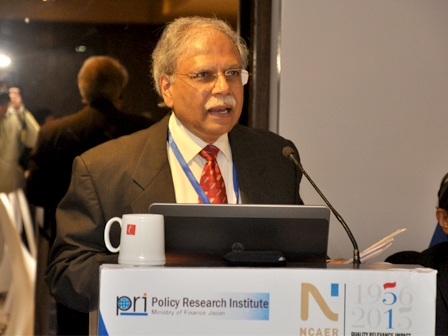Experts from the Japanese and Indian Governments, research think-tanks and the Indian and Japanese corporate sector met for a dialogue focusing on the opportunities and challenges for Japanese foreign direct investment into India. The first Delhi Dialogue, jointly organized by the National Council of Applied Economic Research (NCAER) and the Policy Research Institute (PRI) of the Japanese Ministry of Finance, was held at Hotel Lalit in New Delhi.
NCAER and PRI signed a three-year Memorandum of Intent in January 2015 for joint work and greater collaboration in enhancing economic relation between Japan and India and to explore domestic economic policies and their implementation.<br>
This Delhi Dialogue was extremely timely, coming on the heels of the “Make in India” campaign launched by Prime Minister Narendra Modi in October 2014 and his visit to Japan last year. The percentage of Japanese companies coming to India for business and investment has gone up by 15% in the past year. India and Japan have set ambitious goals. The Special Strategic and Global Partnership between India and Japan expects a 3.5 trillion yen jump in investment financing from public and private sources and a doubling of the number of Japanese companies in India within the next five years. Many have heralded this as a special moment in the development of India’s relationship with Japan.<br>
In this Dialogue, discussions were held to analyse the change and challenges in Indian investment climate with special attention to taxation, land, labour and infrastructure access issues. In the opening session on Development Challenges: India and Japan, Dr Shekhar Shah, Director-General, NCAER welcomed the Japanese participants, noting that this was the start of an exciting and fruitful association between the policy research communities in India and Japan represented by NCAER and PRI. Mr Daikichi Momma, President, PRI, talking about the recent highly positive developments in Indo-Japan relations expressed the hope that the association between PRI and NCAER would set the stage for influential work and productive discussions that would contribute to the goals set by the Special Strategic and Global Partnership between India and Japan.<br>
In the opening session, Mr Rajat Nag, Distinguished Fellow at NCAER and until recently the Managing Director-General of the Asian Development Bank, drew attention to the immense demographic challenges that India (with its large and growing, young population) and Japan (with its falling fertility and aging population) face and the opportunities that it creates. Mr Sanjaya Baru of the London-based International Institute of Strategic Studies and former Media Advisor to the Indian Prime Minister shared his view that over time the economic and strategic potential for a Japan-India relationship could be even greater than for the Japan-US relationship.<br>
Senior officials from Indian Government, including Shri Amitabh Kant, Secretary, Department of Industrial Promotion and Policy, Ministry of Commerce and Industry, Shri Ajay Tyagi, Additional Secretary in the Ministry of Finance, and Shri K.P Krishnan, Additional Secretary, Department of Land Resources in the Ministry of Rural Development all spoke at the Delhi Dialogue focusing on the policy reforms that are underway to improve the ease of doing business in India. Mr Rajiv Lall, Executive Chairman of IDFC Ltd, Mr Roopen Roy, President of the Indian Chamber of Commerce and MD-Consulting, Deloitte, Touche, Tohmatsu, representatives of JETRO and JBIC, and senior company officials from a number of Japanese companies including Maruti-Suziki, Sojitz India, Kawasaki, and others all spoke at the first Delhi Dialogue.<br>
The 2015 Delhi Dialogue is the first of a series of such dialogues between NCAER and PRI. Earlier in the year NCAER Director-General Dr Shekhar Shah gave a workshop at PRI in Tokyo titled “Modinomics meets Abenomics: Will Japan make more in India?” to a large audience of influential policymakers and analysts.<br>









